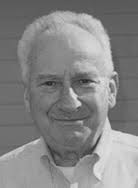We know the universe had an origin or a beginning. Science calls this singularity the "Big Bang" theory, a term originally coined by a very famous scientist (and atheist) named Fred Hoyle. Sir Fred Hoyle Hoyle was mocking the idea that our universe could have had an origin because at that time it was believed our universe was too complex to have had a beginning. The eternal or "steady state" universe was preferred by scientists and intellectuals because the universe with an origin required too much to explain. Hoyle had lots of company with him in agreement in their belief that the universe was eternal, including the atheist philosopher Bertrand Russell. Even very smart people are humans, and all humans make mistakes, both honestly and dishonestly. However, after seeing the evidence for the Big Bang, Hoyle drastically changed his tune and said this: "Some super-calculating intellect must have designed the properties of the carbon atom. Otherwise, the chance of my finding such an atom through the blind forces of nature would be utterly miniscule. A commonsense interpretation of the facts suggests that a super-intellect has monkeyed with physics, as well as chemistry and biology and that there are no blind forces worth speaking about in nature. The numbers one calculates from the facts seem to me so overwhelming as to put this conclusion almost beyond question." Hoyle, Fred, "The Universe: Past and Present Reflections. "Engineering and Science", November 1981. pgs. 8–12. I felt this quote by Dr. Hoyle was so important that I included it in my book The God … [Read more...]
Probability and odds
Probably (pun intended) the most difficult part of my argument for God is to properly convey the unlikelihood of our universe forming because of an unplanned and undirected sequence of events. The odds against the existence of our universe are literally astronomical. Even so, I may have finally stumbled upon a way to present the improbability in language anyone can understand, or layman's terms, using the NCAA basketball tournament popularly known as "March Madness." Recently, ESPN published a rather remarkable story about an otherwise unremarkable neuropsychologist named Gregg Nigl. What was Mr. Nigl's specific claim to fame? Had he made some innovative medical discovery that was some groundbreaking innovation in the world of sports? No. No skill was involved in his otherwise noteworthy "accomplishment." Did he break some unique sports record like hitting the most bullseyes in a game of darts, or somehow make his mark in the Guinness Book of World Records? Nope, that wasn't it, either. What did Gregg Nigl do in 2019 that was so remarkable? He was the first person known to have gone a perfect 48-0 in predictions through two rounds of the NCAA tournament. The odds against picking a perfect NCAA tournament bracket have been estimated as between a somewhat modest 1 in 120 billion for an experienced gambler to correctly guess all the tournament winners to treating the outcome of every game as a coin flip. Those "coin flip" odds have been estimated to be a stunning 1 in 9.2 quintillion. But in 2019 for the first time in history, Nigl's picks were perfect … [Read more...]
Molecular Biologist Franklin Harold’s thoughts on abiogenesis
Described as "one of the world's most respected microbiologists" on the jacket of his hardcover book in our local library, Professor Franklin Harold of Colorado State University has included some fascinating observations In his book The Way of the Cell on the topic of abiogenesis, or the scientific hypothesis about the origin of life. If one cares about the mini-reviews on the back cover, they would seem to lend credibility to his claim of expertise on the subject, given the enthusiastic endorsement of his book by renowned biologist Lynn Margulis. Dr. Harold appears to be imminently qualified to write about the subject in question. In my opinion, his chapter titled "Searching for the beginning" is so remarkable we should start at its beginning. Professor Harold writes, Of all the unsolved mysteries remaining in science, the most consequential may be the origin of life. This opinion is bound to strike many readers as overblown, to put it mildly. Should we not rank the Big Bang, life in the cosmos, and the nature of consciousness on at least an equal plane? My reason for placing the origin of life at the top of the agenda is that resolution of this question is required in order to anchor living organisms securely in the real world of matter and energy, and thus relieve the lingering anxiety as to whether we have read nature's book correctly. Creation myths lie at the heart of all human cultures, and science is no exception; until we know where we come from, we do not know who we are. [emphasis added]"Franklin Harold, The Way of the Cell Many people who argue … [Read more...]
Bacteria and the Origin of Life, by Landon Freeman
[Editorial note: Landon Freeman is one of my bright young internet friends. He wrote this very compelling essay on a subject that interests me quite a bit, and gave me permission to share it here.] AUTHOR BIOGRAPHY: Landon Freeman is a native Georgian who currently studies psychology at Georgia Southwestern State University. He has been interested in the creation-evolution debate for several years now and runs the Facebook group “Evidence for Creation”, which discusses a variety of topics related to creationism and evolution. When not discussing the topic of creation online, Landon can usually be found writing, listening to music, or playing video games. When discussing the hypothesis of abiogenesis, I'm astounded to see that many atheists and evolutionists act as if it's a given that life evolved through purely naturalistic processes, and that life wouldn't have much trouble getting started. There are several issues with abiogenesis, though the one I'm going to discuss is the problem of not only functional, operating organisms arising from non-living matter, but intelligence arising as well. Indeed, even allegedly simple bacteria display intelligence and foresight. An article from NewScientist states and provides evidence that microbes can communicate with each other, make decisions, form communities, and even accelerate mutations to gain new abilities. https://www.newscientist.com/article/dn17390-why-microbes-are-smarter-than-you-thought/ The issue here is bacteria have been living since not long after life began. Life allegedly began around at least 3.5 … [Read more...]
Evolution and the origin of life: analysis by C. W. Bobbitt, PhD
This article written by (retired) Professor Charles W. Bobbitt explains his interpretations of the evidence that may explain the origin of life and the origin of species currently available to the scientific community. Only minor formatting changes have been made to improve its readability. Professor Bobbitt's thoughts regarding the origin of the universe and the Big Bang theory were published earlier here at southernprose.com. Since my book inspired the beginning of our conversation, I am taking the opportunity for shameless self promotion, perhaps even to sell a couple of books in the process. The original plan was to publish a photo of Professor Bobbitt with a short biography describing his background and academic credentials, but apparently our wires have gotten crossed, and the article has been ready to be published for several days. As always, reader comments are welcomed. [Special thanks to Joel Washburn for his expert assistance resolving a rather puzzling and difficult technical problem that prohibited earlier publication of this piece.] A FRESH LOOK AT THE ORIGIN AND DEVELOPMENT OF LIFE ON EARTH C.W. Bobbitt, PhD © Copyright 2014, C.W. Bobbitt In a sense, both Darwin and Wickramasinghe/Hoyle were right in their suggestions as to how life on earth began, as will be shown in this hypothesis; but first, let us make a few remarks to serve as a framework for this presentation, in order to avoid unnecessary and unproductive conflict. Mortal man has been endowed with an insatiable curiosity. He wants to know things simply because they are … [Read more...]


